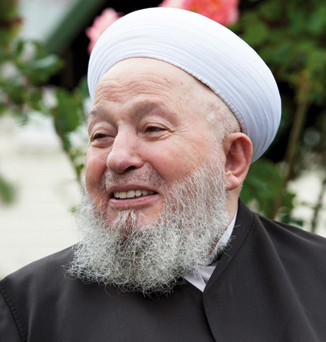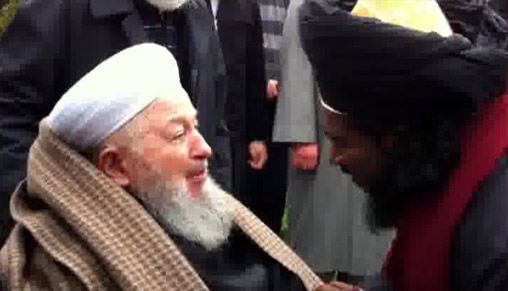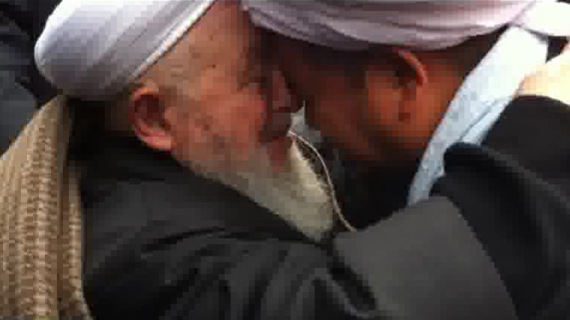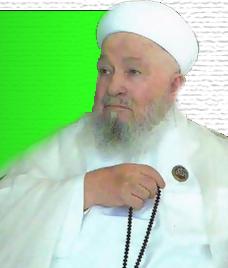SHEIKH MAHMUD EFENDI al-NAQSHIBANDI al-KHÂLIDI
 In our century, when describing the advancement of Islam, it is not possible for historians to ignore Mahmut Ustaosmanoğlu, who is also known as Mahmud Efendi. The fact is that Sheikh Mahmud Efendi is the first figure, not only in Turkey but also in the whole Islamic world, who comes to mind when the word of “taqwa” or the idea of “practicing the Sunnah saniyyah of The Prophet Mohammad
In our century, when describing the advancement of Islam, it is not possible for historians to ignore Mahmut Ustaosmanoğlu, who is also known as Mahmud Efendi. The fact is that Sheikh Mahmud Efendi is the first figure, not only in Turkey but also in the whole Islamic world, who comes to mind when the word of “taqwa” or the idea of “practicing the Sunnah saniyyah of The Prophet Mohammad ![]() ” is mentioned, and this is due to his care on these matters.
” is mentioned, and this is due to his care on these matters.
Mahmud Efendi lives in Istanbul and has spent all of his life in the service of Islam, humanity and peace. He has worked so ambitiously and enthusiastically that it is almost impossible for others to keep pace with him.
Mahmud Efendi was born in 1929 in the province of Trabzon. His father, Ali Efendi, the son of Mustafa Efendi, and his mother, Fatima Hanimefendi the daughter of Tûfan Efendi, were highly respected people who were known for their asceticism and piety.
At the age of six, Mahmud Efendi memorised the Qur’an, at the feet of his father and mother. And, although he was still only a young boy, he performed his prayers in the mosque, giving great importance to extra worship and non-obligatory but recommended prayers (nafelah).
After memorizing the Qur’an, Mahmud Efendi travelled to Kayseri  and took some lessons, like Sarf and Nahv (Arabic language grammer) and Persian, from Tesbihcizade Ahmet Efendi, who is an esteemed scholar in that region.
and took some lessons, like Sarf and Nahv (Arabic language grammer) and Persian, from Tesbihcizade Ahmet Efendi, who is an esteemed scholar in that region.
After remaining in Kayseri for a year, he returned to his home village Of, and studied Qira’at (the Recitation of the Qur’an) from Mehmed Rüşdü Aşıkkutlu Khoja Efendi, the most renowned Qira’at scholar of that period.
Mahmud Efendi learned the sciences of Balaghah (Rhetoric), ‘Elm al-Kalam (Islamic theology), Tafseer (Interpretation of Qur’an), ‘Elmu’l-Hadith ( The Prophet Mohammad’s words, acts and consents), fiqh (Islamic law), usool al-fiqh (Principles of Islamic Jurisprudence) and other Islamic sciencesby Çalekli Haci Dursun Feyzi Efendi, the Senior Professor of Soulaymaneyah Madrasah, who was a distinguished and specialized scholar at the aqlee (intellectual and rational) and naqlee (transmitted) sciences.
 Mahmud Efendi received his diploma with appreciation when he was just 16 years old. In the same year Mahmud Efendi completed his studies, he married Zehra Hanim. The couple were blessed with three children, named Ahmed, Abdullah, and Fatima.
Mahmud Efendi received his diploma with appreciation when he was just 16 years old. In the same year Mahmud Efendi completed his studies, he married Zehra Hanim. The couple were blessed with three children, named Ahmed, Abdullah, and Fatima.
Mahmud Efendi began to volunteer as an Imam after obtaining his degree and continued teaching and preaching.
In June 1952, Mahmud Efendi went to Bandırma for his military service; it was during this time that he met his murshid (the spiritual guide)Sheikh Ali Haydar Efendi.
He completed his military service in 1954, then was appointed as an official imam at the Sheikh al-Islam İsmailağa Mosque in Fatih, Istanbul.
On 1 August, 1960, following the death of his shaikh Ali Haydar Efendi, Mahmud Efendi began the duty of spiritual and ethic guidance.
Sheikh Mahmud Efendi sailed from Istanbul to perform the Hajj  (pilgrimage to Makkah) for the first time in 1962; in 1966 he set out for a second time, travelling from Ankara by plane. From that time on, he performed the Hajj whenever he could.
(pilgrimage to Makkah) for the first time in 1962; in 1966 he set out for a second time, travelling from Ankara by plane. From that time on, he performed the Hajj whenever he could.
During the continuous conflicts between the right and left-wing groups, prior to the coup of 12 September, 1980, Sheikh Mahmud Efenditold the people, who came to him saying: “Let’s perform jehad(the holystruggle)”, that: “It is our duty to revive people by enjoining the good andpreventing the misdeeds, it is not our duty to kill people”. He tried to calm the people and was successful to a great extent.
In 1988, Mahmud Efendi visited Damascus for the first time.
In 1992, he travelled to England and Germany with the purpose oftableegh (conveying and delivering the message of Islam), and again in the same year he went to Bukhara and visited the tombs of mashaayekh (Sufi Shaikhs) and ulama (Islamic scholars).
On 25 May 1993, Mahmud Efendi’s wife, Zehra Hanim, who had been sick for many years, passed away.
On 26 August 1993, Mahmud Efendi married Müşerref Hanim, the  daughter of Sheikh Mansur Baydemir Efendi, a notable and highly-esteemed person from Qahramanmarash (Kahramanmaraş).
daughter of Sheikh Mansur Baydemir Efendi, a notable and highly-esteemed person from Qahramanmarash (Kahramanmaraş).
When he reached the age of 65, he retired from his government job as imam in 1996.
In the same year, Mahmud Efendi went on a journey of umrah (minor pilgrimage), which lasted 40 days.
Then for a second time he travelled to Bukhara, Samarqand, and Tashkent to visit Shah al-Nakshiband and other shaikhs in Uzbekistan.
In February 2005, Sheikh Mahmud Efendi travelled to India to visit the tombs of Imam Rabbani Mujaddedi Alf-i Saani Sheikh Ahmad al-Farooq al-Sarhandi and various other honorable sheikhs of Islam, like Khaja Baqi Billah, Sayyed Nour Muhammad Badauni, Mirza Mazhar Jan-i Janan and Shah Abdullah Dahlawi.
Mahmud Efendi visited the holy city of Damascus for a second time in June 2009, and, in a blessed meeting organized in his honor by the great scholar Housamaddeen Farfour, he came together with eminent figures and scholars of Damascus, such as Abdul Razzaq al-Halabi, Muhammad Adib al-Kallas, and Ramadan al-Buti.
 He presided over so many Islamic scientific sessions and symposiums, encouraged people to obtain knowledge and to act according to the sunnah of The Prophet Mohammad
He presided over so many Islamic scientific sessions and symposiums, encouraged people to obtain knowledge and to act according to the sunnah of The Prophet Mohammad
As mentioned above, in addition to travelling to every region in Turkey, on many occasions Sheikh Mahmud Efendi also travelled to the Middle East, Central Asia, India and Europe in an attempt to call people to the beautiful religion of Islam and the truth. Whenever possible, he would visit Mecca and Medina every year to perform Hajj, and once a year to perform Umrah.
On his most recent visit, between 26 March – 17 April 2011, he performed a spectacular umrah, together with over 50,000 of his friends and followers – something like this had not been witnessed for centuries.
Sheikh Mahmud Efendi’s outstanding knowledge of the Sunnah, his profound knowledge of the sciences of the Shariah and his Islamic demeanor as a whole have made great impressions on both the scholars and learned members of the Islamic world whom he has met during his journeys and on those who have come to visit him. So, Sheikh Mahmud Efendi has justifiably taken up a leading position in the Islamic world and has been honored with the admiration and affection of people from all walks of life.
The Prophet Muhammed ![]() said: “Indeed, Allah will raise a man who will revive the religion for this ummah at the beginning of every century.”(Abu Dawud al-Malahim:1 no:4293, 4/178)
said: “Indeed, Allah will raise a man who will revive the religion for this ummah at the beginning of every century.”(Abu Dawud al-Malahim:1 no:4293, 4/178)
The explanation of this hadith is : “The meaning of tajdeed (reviving) is acting upon the Qur’an and the Sunnah, and reviving this at a time when the commands of the Qur’an and the Sunnah are being destroyed.”
 Thus, based on this hadith, scholars have attempted to determine a Mujaddid at the beginning of every century.On 16 Zilkhade, 1431 (October 24, 2010) approximately 400 renowned and respected members of the ulama (scholars) came from 43 countries to meet in Istanbul; they were all in agreement and declared that Sheikh Mahmud Efendi was the Mujaddid (Reviver) of the 15th Hijri / 21st Gregorian Century.
Thus, based on this hadith, scholars have attempted to determine a Mujaddid at the beginning of every century.On 16 Zilkhade, 1431 (October 24, 2010) approximately 400 renowned and respected members of the ulama (scholars) came from 43 countries to meet in Istanbul; they were all in agreement and declared that Sheikh Mahmud Efendi was the Mujaddid (Reviver) of the 15th Hijri / 21st Gregorian Century.
Mujaddid Sheikh Mahmud Efendi encourages people to obtain knowledge and perform worship not only with his words, but also with his actions; he has never abandoned or neglected any form of worship, and is a source of encouragement and motivation for those who witness his steadfastness. He has carried out many works to educate his people in faith, taqwa, good morals, and respect for people and knowledge.
Muhammad Mazhar al-Farooqe, the seventh grandson of Imam Rabbani Mujaddedi Alf-i Saani Sheikh Ahmad al-Farooq al-Sarhandi and the last shaikh of Mazhari Ribat in Medina Munawwar, visited Sheikh Mahmud Efendi in Istanbul and said: “I have travelled through the worlds; however, in this century I have never encountered an individual who lives full Islam, both external and internal (Shariah and spirutality of Tariqat) as Mahmud Efendi does.”
 Sheikh Mahmud Efendi established the Marifet Association,Federation of Marifet Associations and Ahle Sunnat wal Jamaat Confederation to offer a much better service to Islam and all humanity. These civil organizations work and give service in education, culture, scientific researches, health, charity, helping people in their needs, national and international social organizations under his supervision.
Sheikh Mahmud Efendi established the Marifet Association,Federation of Marifet Associations and Ahle Sunnat wal Jamaat Confederation to offer a much better service to Islam and all humanity. These civil organizations work and give service in education, culture, scientific researches, health, charity, helping people in their needs, national and international social organizations under his supervision.
Mahmud Efendi is keen on developing relationships, especially between Muslim people and countries and wants a peaceful world. Therefore he tries to visit, see and meet people all around the world.
He has a Qur’an tafseer named Ruhu’l Furkan (Rouh al-Furqaan) in Turkish. His preaches are published by Ahıska Publications.
www.ihvanlar.net
